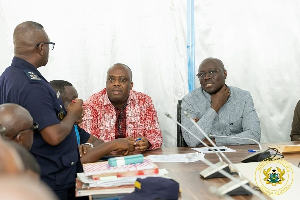Accra, Feb 18, GNA - Mr. Jake Obetsebi-Lamptey, Minister of Tourism and Modernisation of the Capital City, on Wednesday said tourism remained a catalyst for rural transformation and one of the most decisive factors in achieving the goals of development and sustainability in growth and poverty reduction.
He said, "despite its vulnerability to macro-economic and geo-political shocks, tourism is highly resilient and its underlying demand drivers of growing wealth, shrinking borders and expanding technology are robust".
The Minister, therefore, called for the promotion of eco-tourism in rural locations, which among other measures, could help curb the phenomenon of rural-urban migration, and at the same time create the spread of income and reduction of poverty through the multiplier effect. Speaking at a press conference in Accra to brief the press on an eco-tourism project, dubbed: "The Community Based Eco-Tourism Project", the Minister said Ghana's tourism, for instance, steadily increased from 85,000 in 1995 to 530, 827 visitors last year.
He said with the average growth rate of 10 per cent per annum, tourism was expected to rise to one million visitors in 2007 with corresponding revenue of 1.5 billion dollars.
The Nature Conservation Research Centre (NCRC), an international non-governmental organization in collaboration with the Ghana Tourist Board and other partners are implementing the eco-tourism project, which was being funded by USAID.
The project, under the auspices of the Tourism Ministry, and being carried out in 14 communities in the Volta, Western, Eastern, Ashanti, Brong Ahafo, Upper West and Upper East regions, is aimed at accelerating the number of eco-tourists and the revenues realized from their visits. It is also to conserve the natural resources that invariably provide alternate means of livelihood for the local people in the selected communities that include Amedzofe, Wassa Domama, Bunso, Boabeng Fiema, Paga and Tongo/Tengzug.
Under the project, already existing tourist sites were being developed, while new ones were being discovered and developed. Mr John Mason, Executive Director of NCRC, told the press that the project which first started in 1995 in the Volta region, but received financial support from USAID in 2002, had promoted local tourism with 58 per cent increase in local tourists and 42 per cent foreign tourists. Mr Mason said instead of the 20,000-targeted tourists, over 50,000 tourists had so far patronized the project with revenue of 1.024 billion cedis realized so far.
He, however, said local tourists were fond of littering around tourist sites and appealed to such people to use dustbins, which had been provided under the project at tourist sites. According to the Executive Director, over 127 direct employments including guides, cooks, caretakers and receptionists and had been provided for the communities under the project.
On the way forward, Mr Mason said the phase two of the project was being developed to reduce rural poverty, and increase private sector participation in project destinations over a five-year period.
General News of Wednesday, 18 February 2004
Source: GNA












